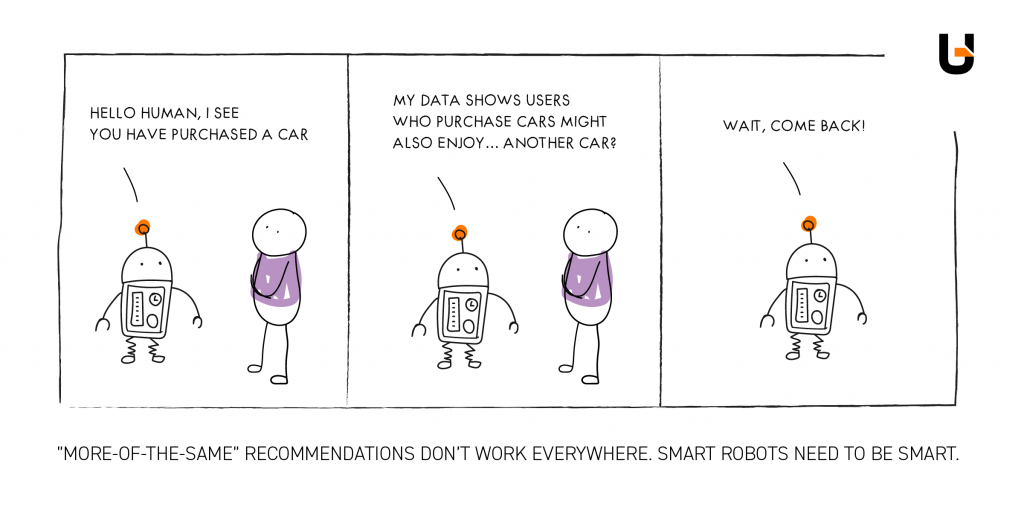How To Improve Customer Engagement? Recommendation Systems!
Recommendation systems are more than a buzzword. They have become one of the most popular ways to improve customer engagement and conversions on websites. An individual and personalized approach is a basic expectation, and users are much more likely to interact with brands that fit their current needs. Let’s find out how recommender systems impact your business!
What are Recommendations Systems?
Recommendation systems are algorithms used to predict what a user might need. They are deployed by companies like Netflix and Amazon to recommend movies and products to their users. Recommendation systems have become ubiquitous in recent years, as they are seen as a way to increase sales and engagement with customers and because users expect it. You can look at them as an equivalent of a professional salesman or concierge who helps each customer to make a right choice.
There are two main types of recommendation systems: content-based and collaborative filtering.
- Content-based recommenders use the content of items (e.g., movie genres) to make recommendations.
- Collaborative filtering recommenders use the behavior of other users (e.g., what movies they have watched) to make recommendations.
Most recommendation systems today use a combination of both content-based and collaborative filtering. For example, Netflix uses content-based recommenders to suggest similar films to ones the user has watched in the past. They also use collaborative filtering to suggest movies that other users who have watched similar movies have also enjoyed.
Recommendation engines can bring benefits to every level of the business, from increasing sales and engagement with customers, to reducing costs by making better use of data. They are aligned with the customer-centric approach, which means delivering the best experience on every stage of the customer journey.
Recommendations Systems Imperfections
Recommendations systems have been around for a few years, but it turns out that, in most cases, they’re far away from perfect. There’s still room for improvements for online stores. Examples?
You order a toy for a kid’s birthday. She hastily unwraps it, and it turns out there are no batteries… big disappointment! The tears start flowing, and you think I wish the batteries were included. Another example – you plan some minor renovation in your apartment and order a foam adhesive because you heard it’s easy to use. When the parcel arrives, you find out that you also need some specific accessories to use the adhesive. You have to drive to the nearby construction store and buy missing equipment. What was supposed to be an easy experience has now become a whole ordeal. Online stores can fix such issues and improve overall customers experience by implementing AI recommendation engines. Without going into too many details, recommendation systems improve with usage – positive and negative feedback helps retrain the model and iterates upon future recommendations.
They can also be very annoying if you buy a washing machine, and then keep getting recommended washing machines for weeks.

The Future of Recommendations Engines
It’s worth noting that we may be drifting to the era of automatically filling shopping carts. Referring to the example above – after adding an electronic toy to the cart, such an advanced system could add batteries automatically. It’d be a client’s decision to remove the products before the checkout.
Now, let’s imagine a B2B company selling specialist tools online. Every client belongs to a specific segment, defined by their purchase history. The so called ‘A priori’ algorithm analyzes orders history in every segment, creates a list of product pairs and assigns probabilities to them. When the client adds a rotary hammer to the cart, for example, the system can suggest an additional accessory, such as spare drills or battery chargers. An additional incentive for purchasing may be a discount for the whole set recommended by the system.
Another interesting concept is the creation of a cart system, where the client defines the maximum price to pay for specific products and the system recommends the most accurate mix for them. Obviously, their purchase history is taken into consideration. Let’s say you’re shopping in an online grocery store and want to buy a mix of different fruits for a maximum of 30 euros. The recommendation system could take into account all current discounts, combined your purchase history, and then fill the cart with your favorite fruits.
These are only a few examples of how recommendations systems can evolve. It all depends on the creativity and specific business cases.
How Exactly Can Recommendation Systems Help Your Business?
Despite the shortcomings in implementing system recommendations by many online stores, the development of recommendation systems has progressed significantly. They provide personalized recommendations to users based on their past behavior, and they have been shown to increase website engagement and conversions between 35-70%. And when you look at the higher conversion combined with fewer returns, you have not only significant savings but also loyal and satisfied clients.
So, what are the benefits of implementing a recommendation system on your website? Just to name a few:
1. Increased Engagement and Conversions
2. Improved Customer Retention
3. Increased Customer Lifetime Value
4. Greater insights into customer behaviour
5. More targeted marketing and advertising

Let’s take a closer look at the specific aspects of the company and how properly implemented recommendations systems can positively influence the business and customer satisfaction.
First of all, the marketing department spend less money on advertising new products. The system automatically suggest new and/or related items to clients in order to support cross-selling. Moreover, marketers can prepare more accurate and personalized communication. For instance, newsletters can be built on more factors than just a name and, as a result, you can send a unique email to every single customer. This translates to higher open rates and clicks… and more engaged clients.
The sales team will similarly note higher margin incomes as a recommendation algorithm can calculate and match your offer to each individual user. Thanks to recommendation engines, you can propose the best-selling products, check customer reactions to new products and update recommendations in order to adapt to changing preferences. Recommendation engines can also add complementary products (cross-selling) or more expensive alternatives to increase shopping cart sizes & values (upselling).
Tailored recommendations also equal fewer returns, which is great news for logistics, customer service and accounting departments. Reducing the number of returns brings pure savings, not to mention an important impact on the sustainability aspects by decreasing the company’s carbon footprint. It stands in line with mandatory EU sustainability reporting for companies starting in 2024 (Due Diligence Directive) and the growing number of customers who expect brands to be more environment friendly.
Conclusion
Whether you run a B2C or B2B online store, an AI recommendation system enable you to reach customers more effectively, offer a better product or service tailored to their needs, and even adjust the order in which products are displayed to the user. Working in harmony, product, service and content-based recommendation tools respond directly to buyer needs in real time, leading to a completely unique shopping experience.
We highly encourage (or you could say… recommend 😉) taking advantage of the power of recommendation systems and include it in your online shop strategy.
Learn how to implement recommendation systems in your business








